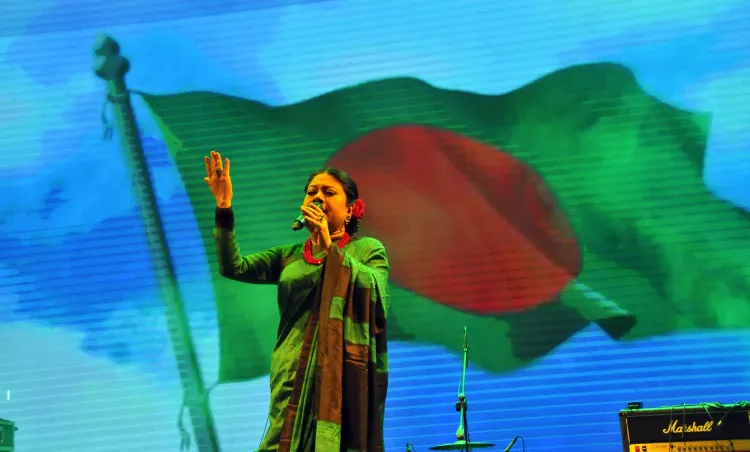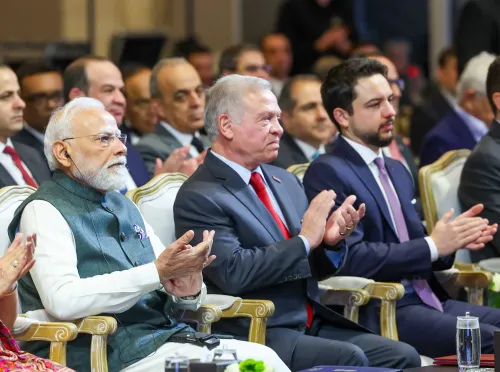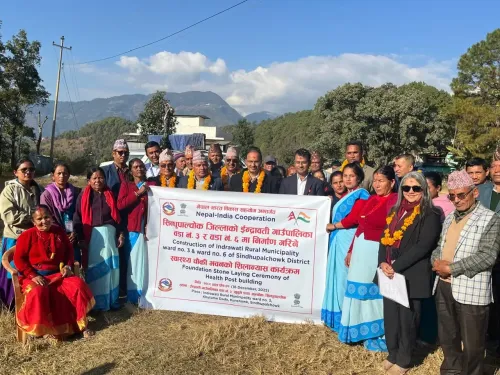Bangladesh at a Pivotal Moment: Seeking Hope on Independence Day

Synopsis
Key Takeaways
- Historical Context: Bangladesh's liberation struggle against Pakistan.
- Current Crisis: Escalating lawlessness and violence.
- Societal Impact: Minorities and women facing increased dangers.
- Government Accountability: Need for reforms and security measures.
- Future Risks: Potential chaos threatening national stability.
New Delhi: Fifty-four years ago, the President of Pakistan, General Yahya Khan, arrived in Dhaka and engaged in a series of discussions with Sheikh Mujibur Rahman from March 16 to March 24, none of which yielded any resolution. This was likely a time-buying tactic, a deceptive move while a perilous plan was being devised by the military to extinguish the dreams of the Bengali people forever.
On the night of March 25, the Pakistan army, alongside its accomplices, initiated a genocidal campaign against the civilian population of East Pakistan, codenamed 'Operation Searchlight'. Thousands were slaughtered within the initial days, and Sheikh Mujibur Rahman declared the complete independence of Bangladesh in the early hours of March 26. He was quickly arrested by the Pakistani military and transported to Karachi in West Pakistan, where he remained in captivity throughout the liberation war.
The operation, as envisioned by the Western Pakistani Generals, aimed at eliminating key members of the Awami League, influential civilians, and military personnel supportive of the Awami League. Elements of deception, speed, and surprise were emphasized as critical for annihilation. The army and its allies were authorized to use any necessary force to achieve this vile goal, employing tactics of search, assault, arson, and rape across civilian areas. After a harrowing nine-month liberation war, the people of Bangladesh emerged victorious, reclaiming their freedom from devastation and death, marking a monumental achievement in the subcontinent's history where countless martyrs, including women and children, paid the ultimate price.
Ironically, the circumstances have drastically changed, revealing that the nation now stands at a crucial crossroads. The very essence of liberation from Pakistan and its allies is being systematically erased. The interim government has failed to provide even the most basic security to its citizens, particularly the minorities, leading to a continually worsening law and order situation.
The conditions in the capital, Dhaka, have deteriorated significantly, with rising incidents of theft and robbery. Escapees from jail have begun using advanced firearms in broad daylight, instilling fearlessness among criminals. The situation has become so dire that women passengers are being assaulted without any challenge on public transport. Testimonials from women and young children recount experiences of sexual assault, with efforts being made to eliminate all evidence, including family members.
A disturbing trend is that a significant number of the rape victims belong to minority communities. Unhindered forced religious conversions are occurring nationwide, and extortion and unlawful property seizures have surged, resulting in rampant anarchy.
Women’s organizations have taken to the streets of Dhaka, demanding justice for the brutal rape and subsequent death of a minor, with the situation remaining highly volatile. The safety and freedom of women are fundamental to Bengali society and culture – a principle that was non-negotiable in 1971 and continues to be so.
Consequently, criminals are emboldened to target critical security infrastructure, such as the Air Force base in Cox's Bazar. In a nutshell, the law and order situation has spiraled downward exponentially under Muhammad Yunus's governance, nearing collapse.
As a result, ordinary citizens are compelled to protest and express their frustrations. Rather than fostering trust and collaboration between the government and its people, the divide of distrust is deepening, and the rift between the state and its citizens is rapidly expanding. Many convicted criminals and members of banned terror groups roam freely, instilling fear in citizens and preventing them from leaving their homes. Security is now compromised even within their own residences, as calls to establish a new 'Caliphate' resonate across Bangladesh. A climate of panic has engulfed Bangladesh during the current interim government's tenure.
The security landscape along the Dhaka-Chittagong highway, regarded as the economic lifeline, has seen a dramatic decline. This route has transformed into a nightmare for commuters, becoming one of the most perilous pathways in the country. Expatriates, business individuals, drivers, and even garment workers face armed robberies. The degradation of law and order nationwide is symptomatic of a deeper issue.
The caretaker government must take immediate action to restore law and order by reforming the police force, ensuring accountability for state violence, and dismantling terrorist networks. Numerous obstacles lie ahead for Bangladesh, as the defeated factions of 1971 seek revenge, aspiring to reshape Bangladesh into a monolithic state that obliterates the pluralistic values and diverse social fabric.
Once recognized as the true Asian tiger, Bangladesh has made remarkable economic transformations and improvements in various globally acknowledged social indicators over the past decade. However, the threat of Bangladesh descending into chaos and regression not only jeopardizes its citizens but also poses global repercussions due to the potential risks associated with the country's failure.
(The writer, who has recently released a book on Sheikh Mujibur Rahman, resides in London. The views expressed are personal.)










